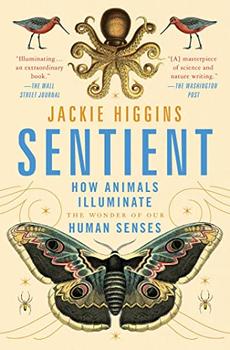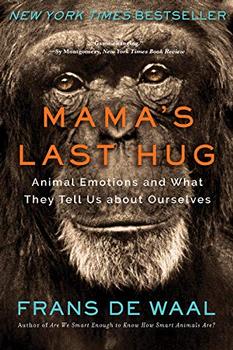Summary | Excerpt | Reviews | Beyond the book | Read-Alikes | Genres & Themes | Author Bio

The Thoughts and Emotions of Our Fellow Creatures
by Virginia MorellWhile most of us can intuit that animals possess some emotional abilities, the specifics might elude us. Virginia Morell's book, Animal Wise, gives us many examples of these qualities. Did you know, for example, that ants have a strong ability to teach and learn and that some parrots can understand abstract concepts like "same" and "different", or "larger" and "smaller"?
How can science prove the cognitive, emotional and social abilities of animals? Morell's book of popular science, an extension of her career as correspondent for National Geographic Magazine, Science and Smithsonian, shows us how. It takes the reader on a journey through scientific research centers in different countries and sheds light on the experiments carried out at these laboratories. These studies focus on various animal genres – from small invertebrates to primates.
In Animal Wise, Morell also presents the many scientific experiences and observations that have resulted from this research. She offers clues and fragments of knowledge that draw important conclusions about the study of animal thought processes – a field of research called "cognitive ethology." Studies now confirm what those of us glued to nature programs have long believed: that elephants have excellent memory, self-consciousness, effective social skills and mourn the death of other elephants; that dolphins are self-aware, display many communication capabilities and other skills that place them among the wisest animals; and that chimpanzees appear to possess (see 'Beyond the Book') an incredible photographic memory, as well as an extraordinary aptitude to use tools, teach and learn.
The book has a brief historical introduction, which is especially interesting because it reviews early philosophers' theories – including those from Voltaire and Descartes – about animal cognitive abilities. We realize to what extent some of our traditional ideas about animal wisdom have become completely obsolete. For example, the human being is not considered the model by which the abilities of other animals should be measured and that certain cognitive abilities, traditionally attributed only to humans, are shared and have evolved independently in many other animal species. Language too is not a defining human trait - although they do not use words, animals learn and share all kinds of signs to interact and thrive as a species.
Animal Wise suffers from excessive descriptive journalism; it could present deeper scientific reflections and emphasize in greater depth, the moral and ecological responsibilities (which form the field of bioethics) derived from this new knowledge. A more detailed look at the philosophical and scientific roots of the anthropocentric prejudices that have led to our current environmental crisis, would also have been helpful.
Despite these flaws, Animal Wise serves to deconstruct the many misconceptions about the inferiority of animals with respect to Homo sapiens. The book teaches us to realize that animals have distinct personalities like us; that cognition and sensation are inseparable; and that, in many cases, animals' self-awareness is such that it turns them into subjects, not mere objects at our disposal. The most interesting corollary of the book is the moral urgency to defend and respect all living beings. The book ends with the hope that a change in our attitude could save countless endangered species from extinction.
Animal Wise is a very interesting starting point for further investigations in the field of animal cognition and ecology, and the information it offers is essential for a new respectful and conscientious approach to our knowledge and relationship with our non-human brothers. Readers who are new to the field of animal behavior will find valuable nuggets of information. What we need now, following this new ecosophy, is a sequel – entitled Human Wise.
![]() This review was originally published in The BookBrowse Review in April 2013, and has been updated for the
April 2014 edition.
Click here to go to this issue.
This review was originally published in The BookBrowse Review in April 2013, and has been updated for the
April 2014 edition.
Click here to go to this issue.

If you liked Animal Wise, try these:

by Jackie Higgins
Published 2022
Perfect for fans of The Soul of an Octopus and The Genius of Birds, this remarkable book explores how we process the world around us by analyzing the incredible sensory capabilities of thirteen animals and reveals that we are not limited to merely five senses.

by Frans de Waal
Published 2020
New York Times best-selling author and primatologist Frans de Waal explores the fascinating world of animal and human emotions.
Your guide toexceptional books
BookBrowse seeks out and recommends the best in contemporary fiction and nonfiction—books that not only engage and entertain but also deepen our understanding of ourselves and the world around us.